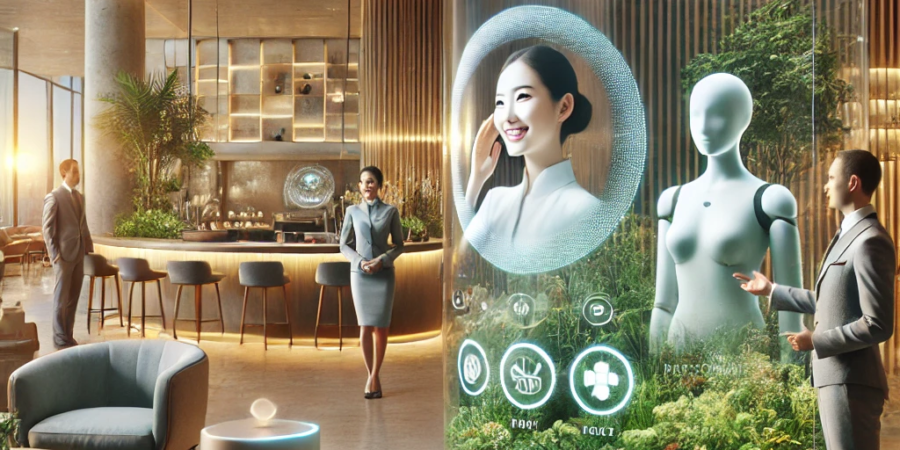{Podcast} 12 Travel Trends for 2025: What’s Next for Hospitality?
Having spent decades working with the travel and hospitality industry, I’ve seen the sector weather many storms and innovations. From being part of a design team that revolutionised hotel check-ins for a Chicago Hotel, with movable lobby pods, to helping brands integrate AI-driven guest experiences,
I’ve always emphasized that travel is resilient. Despite global uncertainty and cost-of-living pressures, travel is back, and it’s growing stronger than ever—just as I predicted during the pandemic.
As we look ahead to 2025, the landscape is set to evolve dramatically, driven by the intersection of technology, wellness, and sustainability. Recently, in my chat with Phil Whelan on Hong Kong’s Radio 3, we discussed these exciting developments. Let’s dive into the 12 travel trends for 2025 that will shape the future of the industry.
1. Hyper-Personalization Through AI
The future of travel is all about AI-driven personalization. Hotels are increasingly relying on AI to anticipate guest preferences—from room temperature to dining options—before guests even step foot in the hotel. As I mentioned during my Chicago hotel project 15 years ago, I advocated for movable check-in pods, eliminating barriers and personalizing guest experiences. In 2025, these personalized experiences will go even further with AI-powered concierge services and smart room features.
The Oracle and Skift report found that travellers want frictionless, seamless experiences through technology. Contactless check-ins and voice-activated services are becoming the new standard, but as I’ve long argued, human warmth still plays an essential role. AI can enhance, but not replace the emotional connection between guests and hospitality staff.

2. Sleep Retreats and Hurkle Durkling
Wellness tourism is evolving to focus not only on the body but also on mental well-being. By 2025, sleep retreats and hurkle durkling—a Scottish term for lounging in bed all day—will become common. Travelers are seeking balance, using vacations as a time to recover from the demands of daily life. This aligns with the growing trend of slow travel, where guests spend more time focusing on their mental and physical rejuvenation.
In our Radio 3 discussion, Phil and I talked about how people are using travel not just for adventure but for deep relaxation, highlighting that well-being is becoming central to modern travel.
3. Revisiting Childhood Destinations
Nostalgia will continue to shape family travel in 2025. 58% of families are revisiting childhood destinations, offering a chance to reconnect with fond memories. This trend also ties into the slow travel movement, where travellers take their time to explore and bond with their surroundings. Families are opting for regional destinations and secondary cities, rather than traditional tourist hotspots.
As I’ve explored in my work on regional tourism, these trips provide emotional and experiential richness, making them far more meaningful than quick, checklist-style vacations.

4. Tech Meets Digital Detox
While AI and tech are becoming integral to travel, there’s also a growing demand for digital detox. According to Skift and Oracle, 24% of travellers are intentionally disconnecting from social media during their trips, while 63% prefer digital room keys and other tech features. The trick for hotels will be finding a balance between offering tech conveniences and providing spaces for true relaxation.
5. Workcations and “Frolleagues”
The concept of blending work and play—or bleisure—will only continue to expand. 30% of travellers are hitting the road with frolleagues (friends who are also colleagues) and expect hotels to accommodate their need for both work and relaxation. Flexible workspaces will become critical in this space, according to the Oracle report, as more people look for environments that support productivity while traveling.
6. Culinary Experiences and Sober-Curious Travel
Food tourism is on the rise, with 50% of travellers booking restaurant reservations before they even land. However, the sober-curious movement is also gaining traction, with one in four travellers reducing alcohol consumption on their trips. Hotels and restaurants should begin offering mindful dining options that cater to both indulgence and health-conscious preferences.
7. Pet-Friendly Hotels and Solo Travel
The demand for pet-friendly hotels is rising, with 25% of solo travellers bringing pets along. Solo travel itself is growing in popularity, with Gen Z (55%) and Millennials (51%) more likely to explore new places alone. These travellers are often seeking self-discovery and mental wellness, requiring hotels to offer quiet, reflective spaces and tailored experiences for independent explorers.
8. Sustainability is Essential
Sustainable travel is no longer optional. 88% of travellers want to make eco-conscious choices, meaning hotels need to adopt sustainable practices like zero-waste, local sourcing, and energy-efficient designs. The focus on sustainability aligns with the slow travel movement, where reducing one’s carbon footprint and supporting local communities are now top priorities.
9. Experience-Based Loyalty Programs
Loyalty programs are shifting from points-based to experience-based. By 2025, travellers will expect personalized rewards and unique perks that go beyond the traditional points system. Hotels will need to reimagine how they incentivize loyalty, offering memorable experiences that resonate with individual guests.
10. Soft Travel for Mental Wellbeing
The trend toward soft travel—focused on simplicity and spontaneity—is gaining momentum. 20% of travellers are planning getaways focused on self-discovery and mental well-being, seeking travel experiences that offer mental clarity rather than packed itineraries.
11. Health and Safety Still Matter
Even as we move past the pandemic, health and safety remain key concerns. Hotels must continue offering enhanced hygiene protocols and contactless services to maintain guest confidence. Safety-first travel will continue to shape traveller expectations, ensuring peace of mind remains a priority.
12. Multi-Generational Travel is Rising
Traveling across generations is becoming more common, as families of all ages look for shared experiences. Multi-generational travel will be a key driver of the industry in 2025, with hospitality providers needing to cater to the needs of children, parents, and grandparents alike.
Next Steps for Hospitality in 2025
As we’ve seen, the 12 travel trends outlined here paint a picture of a future where balance between technology, sustainability, wellness, and human connection is critical. To stay ahead of the curve, here’s what hospitality providers need to focus on:
- Leverage AI for Hyper-Personalization but ensure that human warmth remains central to guest experiences.
- Design flexible spaces that cater to the growing need for bleisure and workcations.
- Prioritize wellness by offering retreats and experiences focused on mental and physical health.
- Embrace sustainability by adopting eco-friendly practices that align with consumer preferences.
- Reinvent loyalty programs to focus on unique, experience-based rewards.
As we approach 2025, it’s clear that innovation in travel and hospitality is not just about adapting to trends but about leading the charge. My decades of experience in the industry have shown me that success is about balancing human connection with technology, offering personalised and meaningful experiences for every traveller.
Currently, in my joint venture with a major hotel group, we’re actively working on innovative solutions to incorporate many of these trends—from AI-driven personalization to sustainability—ensuring that we meet the evolving needs of guests. The future of hospitality is not just about providing a bed for the night; it’s about crafting an experience that resonates deeply with each guest, creating memorable moments that will keep them coming back.
As we continue to reimagine the industry, I look forward to helping more organisations navigate these exciting changes and leverage these trends to create next-level experiences for their guests.
About Morris Misel
Morris Misel is an award-winning global futurist and hospitality expert with over 30 years of experience.
Having consulted for top-tier hotel brands and tourism operators globally, Morris is currently involved in a joint venture with a leading hotel group, spearheading their innovation and transformation strategy. His work focuses on integrating innovation, AI, personalisation, and sustainability into hospitality, helping brands stay ahead of the curve while delivering exceptional guest experiences.
When he’s not forecasting the future of travel, Morris can be found sharing insights on AI, digital transformation, and the future of business across boardrooms’, stages and media worldwide.
For more on the Future of Travel listen to my interviews on:
Hong Kong Radio 3 segment (15 minutes 30 seconds)
and
Triple M Breakfast (5 minutes 20 seconds)
#FutureOfTravel #Hospitality2025 #AIInHospitality #SustainabilityInTourism #TravelAndWellness #WorkAndPlay #PetFriendlyHotels #DigitalDetoxTravel #CulinaryExperiences #TravelTrends #Workcations #SoloTravel #FuturistThinking #HospitalityInnovation #EventOrganizers #StrategicPlanning #LeadershipInHospitality #BusinessStrategy #MEA


